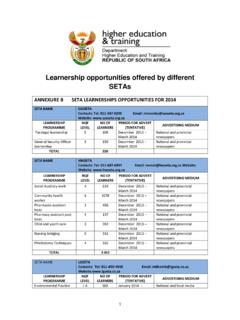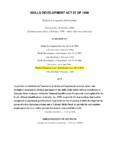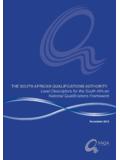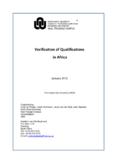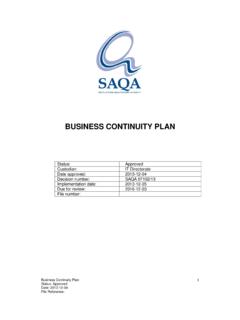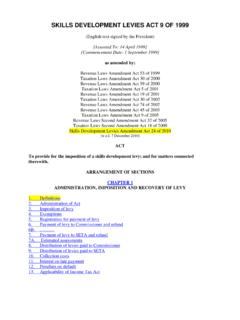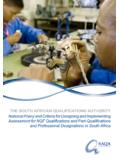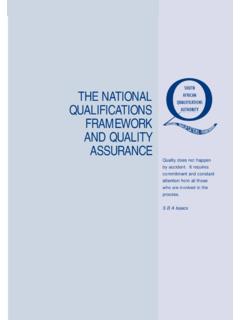Transcription of NATIONAL QUALIFICATIONS FRAMEWORK ACT
1 NATIONAL QUALIFICATIONS FRAMEWORK ACT 67 OF 2008 [Assented To: 17 february 2009] [Commencement date:1 June 2009] [GN 576 / GG 32233 / 20090522] as amended by . Higher Education Laws Amendment Acts 26 of 2010 [with effect from 7 December 2010] ACT To provide for the NATIONAL QUALIFICATIONS FRAMEWORK ; to provide for the responsibilities of the Minister of Higher Education and Training; to provide for the South African QUALIFICATIONS Authority; to provide for Quality Councils; to provide for transitional arrangements; to repeal the South African QUALIFICATIONS Authority Act, 1995; and to provide for matters connected therewith. [Long title substituted by s. 15 of Act 26/2010] PREAMBLE WHEREAS the advancement and recognition of learning is an essential attribute of a free and democratic nation and a prerequisite for the development and well-being of its citizens; WHEREAS the NATIONAL QUALIFICATIONS FRAMEWORK has been developed and implemented in terms of the South African QUALIFICATIONS Act, 1995; WHEREAS the NATIONAL QUALIFICATIONS FRAMEWORK has won wide acceptance as the principal instrument through which NATIONAL education and training QUALIFICATIONS are recognised and quality-assured; and WHEREAS a review of the implementation of the NATIONAL QUALIFICATIONS FRAMEWORK has necessitated changes to the governance and organisation of the FRAMEWORK so that its objectives may be more effectively and efficiently realised, BE IT THEREFORE ENACTED by the Parliament of the Republic of South Africa, as follows:- TABLE OF CONTENTS CHAPTER 1 DEFINITIONS, OBJECT AND APPLICATION OF ACT 1.
2 Definitions2. Object of Act3. Application of Act CHAPTER 2 NATIONAL QUALIFICATIONS FRAMEWORK 4. Framework5. Objectives of NQF6. FRAMEWORK levels7. Sub-frameworks CHAPTER 3 RESPONSIBILITIES OF MINISTERS 8. Responsibilities of Minister9.. CHAPTER 4 SOUTH AFRICAN QUALIFICATIONS AUTHORITY 10. Continued existence of SAQA11. Objects of SAQA12. Accountability of SAQA13. Functions of SAQA14. SAQA board15. Vacation of office by board member and filling of vacancies16. Committees of board17. Meetings of board and committees18. Allowances and remuneration of members of board and committees19. Appointment of chief executive officer and staff20. Functions of chief executive officer21. Funds of SAQA22. Alienation and encumbrance of property23. Financial statements, audit and annual report CHAPTER 5 QUALITY COUNCILS 24. QC for General and Further Education and Training25.
3 QC for Higher Education26. QC for Trades and Occupations27. Functions of QCs CHAPTER 6 PROFESSIONAL BODIES 28. Co-operation with QCs29. Recognition by SAQA30. Registration of professional designation31. Information CHAPTER 7 GENERAL PROVISIONS 32. Delegation33. Regulations34. Conflicting interpretation35. Saving36. Transitional arrangements37. Repeal of law38. Short title and commencement CHAPTER 1 DEFINITIONS, OBJECT AND APPLICATION OF ACT 1. Definitions In this Act, unless the context indicates otherwise- board means the board of the SAQA established by section 14; Council on Higher Education means the Council established in terms of section 4 of the Higher Education Act, 1997 (Act of 1997); education institution means an education institution that is established, declared or registered by law; Gazette means Government Gazette; GENFETQA Act means the General and Further Education and Training Quality Assurance Act, 2001 (Act No.)
4 58 of 2001); Higher Education Act means the Higher Education Act, 1997 (Act No. 101 of 1997); learning means the acquisition of knowledge, understanding, values, skill, competence or experience; level means a level contemplated in Chapter 2; Minister means the Minister of Higher Education and Training; [Definition of Minister substituted by s. 8 of Act 26/2010] NQF means the NATIONAL QUALIFICATIONS FRAMEWORK contemplated in Chapter 2; part qualification means an assessed unit of learning that is registered as part of a qualification ; PFMA means the Public Finance Management Act, 1999 (Act of 1999); professional body means any body of expert practitioners in an occupational field, and includes an occupational body; professional designation means a title or status conferred by a professional body in recognition of a person s expertise and right to practise in an occupational field; qualification means a registered NATIONAL qualification ; quality council means a Quality Council contemplated in Chapter 5; QC means a quality council; registered means registered on the NQF by SAQA in terms of Chapter 4; relevant Minister.
5 [Definition of relevant Minister repealed by s. 8 of Act 67/2008 ] SAQA means the South African QUALIFICATIONS Authority contemplated in Chapter 4; SAQA Act means the South African QUALIFICATIONS Authority Act, 1995 (Act No. 58 of 1995); sector means a sector of education or training, as the case may be, for whose sub- FRAMEWORK a QC is responsible; Skills Development Act means the Skills Development Act, 1998 (Act No. 97 of 1998); skills development provider means a skills development provider contemplated in section 17 of the Skills Development Act; sub- FRAMEWORK means a sub- FRAMEWORK contemplated in Chapter 2; this Act includes the regulations; Umalusi means the council established by section 4 of the GENFETQA Act. 2. Object of Act The object of this Act is to provide for the further development, organisation and governance of the NQF. 3. Application of Act (1) This Act applies to- (a) education programmes or learning programmes that lead to QUALIFICATIONS or part- QUALIFICATIONS offered within the Republic by- (i) education institutions; and (ii) skills development providers; and (b) professional designations, subject to the limitations prescribed in this Act.
6 (2) Every qualification or part- qualification contemplated in subsection (1) must be registered on the NATIONAL QUALIFICATIONS FRAMEWORK in accordance with this Act. [S. 3 substituted by s. 9 of Act 26/2010] CHAPTER 2 NATIONAL QUALIFICATIONS FRAMEWORK 4. FRAMEWORK The NQF is a comprehensive system approved by the Minister for the classification, registration, publication and articulation of quality-assured NATIONAL QUALIFICATIONS . 5. Objectives of NQF (1) The objectives of the NQF are to- (a) create a single integrated NATIONAL FRAMEWORK for learning achievements; (b) facilitate access to, and mobility and progression within, education, training and career paths; (c) enhance the quality of education and training; (d) accelerate the redress of past unfair discrimination in education, training and employment opportunities. (2) The objectives of the NQF are designed to contribute to the full personal development of each learner and the social and economic development of the nation at large.
7 (3) SAQA and the QCs must seek to achieve the objectives of the NQF by- (a) developing, fostering and maintaining an integrated and transparent NATIONAL FRAMEWORK for the recognition of learning achievements; (b) ensuring that South African QUALIFICATIONS meet appropriate criteria, determined by the Minister as contemplated in section 8, and are internationally comparable; and (c) ensuring that South African QUALIFICATIONS are of an acceptable quality. 6. FRAMEWORK levels (1) The NQF is organised as a series of levels of learning achievement, arranged in ascending order from one to ten. (2) Each level on the NQF is described by a statement of learning achievement known as a level descriptor. (3) A level descriptor, referred to in subsection (2), provides a broad indication of learning achievements or outcomes that are appropriate to a qualification at that level. (4) Level descriptors must be developed and determined, as provided for in section 13(1)(g).
8 (5) There is one set of level descriptors for the NQF. 7. Sub-frameworks The NQF is a single integrated system which comprises of three co-ordinated QUALIFICATIONS sub-frameworks, for- (a) General and Further Education and Training, contemplated in the GENFETQA Act; (b) Higher Education, contemplated in the Higher Education Act; and (c) Trades and Occupations, contemplated in the Skills Development Act. CHAPTER 3 RESPONSIBILITIES OF MINISTERS 8. Responsibilities of Minister (1) The Minister has the overall executive responsibility for the- (a) NQF; (b) SAQA; and (c) QC for General and Further Education and Training, the QC for Higher Education and the QC for Trades and Occupations contemplated in Chapter 5. [Para. (c) substituted by s. 10 of Act 26/2010] (2) The Minister must- (a) consider advice from SAQA or a QC in terms of this Act; (b) determine policy on NQF matters in terms of this Act and publish the policy in the Gazette; [Para.]
9 (b) substituted by s. 10 of Act 26/2010] (c) publish guidelines which set out the government s strategy and priorities for the NQF, and which may be updated annually; [Para. (c) substituted by s. 10 of Act 26/2010] (d) provide funds from money appropriated by Parliament for SAQA to enable it to fulfil its functions in terms of this Act; (e) after considering advice from the SAQA, determine the sub-frameworks contemplated in section 7 and publish them in the Gazette; and [Para. (e) substituted by s. 10 of Act 26/2010] (f) determine by regulation in the Gazette, the process by which a dispute involving the SAQA or a QC must be resolved, and any matter relating thereto. [Para. (f) substituted by s. 10 of Act 26/2010] (3) The Minister must- [Words preceding para. (a) substituted by s. 10 of Act 26/2010] (a) advance the achievement of the objectives of the NQF contemplated in Chapter 2; (b) uphold the coherence and public credibility of the NQF; (c) encourage collaboration among the QCs and between the QCs and SAQA.
10 (4) The Minister may perform any other function consistent with this Act. 9.. [S. 9 repealed by s. 11 of Act 26/2010] CHAPTER 4 SOUTH AFRICAN QUALIFICATIONS AUTHORITY 10. Continued existence of SAQA The SAQA that existed immediately before the commencement of this Act, continues to exist as a juristic person under the name of the South African QUALIFICATIONS Authority. 11. Objects of SAQA The objects of the SAQA are to- (a) advance the objectives of the NQF contemplated in Chapter 2; (b) oversee the further development and implementation of the NQF; and (c) co-ordinate the sub-frameworks. 12. Accountability of SAQA The SAQA is accountable to the Minister. 13. Functions of SAQA (1) The SAQA must, in order to advance the objectives of the NQF- (a) (i) perform its functions subject to this Act; and (ii) oversee the implementation of the NQF and ensure the achievement of its objectives; (b) advise the Minister on NQF matters in terms of this Act; [Para.]
